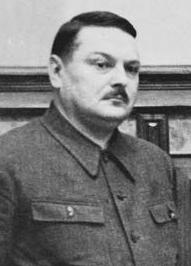Andrei Zhdanov
Appearance

Andrei Alexandrovich Zhdanov (26 February [O.S. 14 February] 1896 – 31 August 1948) was a Soviet politician. He was one of Joseph Stalin's closest associates, replacing Sergei Kirov as Leningrad party chief and playing a major role in the Great Purge. His reputation suffered during World War II after he supported the Molotov-Ribbentrop Pact with Nazi Germany and the Winter War against Finland. However, he would later be influential in shaping Soviet cultural and foreign policy at the beginning of the Cold War, directing the Cominform and instituting stricter censorship. As Second Secretary between 1939 and his death in 1948, he was considered the right-hand man and likeliest successor to Stalin.
| This article about a political figure is a stub. You can help out with Wikiquote by expanding it! |
Quotes
[edit]- The new electoral system gives us a powerful tool to improve the work of the entire Soviet system, in order to eliminate bureaucratic phenomena, shortcomings and deformations in Soviet organizations. And these shortcomings are, as you know, very real. Our Party organizations must be prepared for the election campaign. In the elections, they must deal with hostile propaganda and hostile candidates.
- Zhdanov in 1937. Translated from Swedish in the article Om socialismens demokratiska erfarenheter [1] by Anders Carlsson.
- The only conflict that is possible in Soviet culture is the conflict between good and best.
- Quoted in Aly Monroe, "Black Bear"
Quotes about
[edit]- Marshall Plan Aid was rejected by the Soviet Union as a form of economic imperialism. This aid certainly represented a demonstration of American strength that could serve to create links. This rejection created a new boundary line: between the areas that received such aid and those that did not. The Soviets, meanwhile, alongside establishing and monitoring Communist governments in individual states, moved to consolidate their bloc and to advance its interests. One step was the creation, in September 1947, of the Cominform, the Communist Information Bureau, a recrudescence of the Comintern, which brought together European Communist parties under Soviet guidance. The existence of ‘two camps’ was announced by Andrei Zhdanov, Stalin’s key ideological adviser, who chaired the first meeting.
- Jeremy Black, The Cold War: A Military History (2015)


